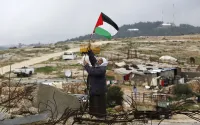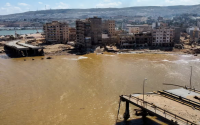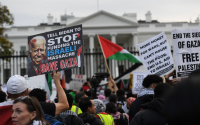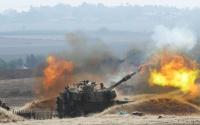Published on Monday, July 29, 2002 in the New York Timesby David E. Sanger and Thom Shanker
WASHINGTON — As the Bush administration considers its military options for deposing Saddam Hussein, senior administration and Pentagon officials say they are exploring a new if risky approach: take Baghdad and one or two key command centers and weapons depots first, in hopes of cutting off the country's leadership and causing a quick collapse of the government.
The "inside-out" approach, as some call this Baghdad-first option, would capitalize on the American military's ability to strike over long distances, maneuvering forces to envelop a large target. Those advocating that plan say it reflects a strong desire to find a strategy that would not require a full quarter-million American troops, yet hits hard enough to succeed. One important aim would be to disrupt Iraq's ability to order the use of weapons of mass destruction.
The advantages and risks of strikes aimed deep inside the country and radiating outward are now under active discussion, according to senior administration and Defense Department officials. No formal plan has yet been presented to President Bush or the senior members of his national security team, and several officials cautioned that a number of alternatives were still under consideration.
The inside-out ideas are essentially the reverse of the American strategy in the Persian Gulf war of 1991, which dislodged Mr. Hussein's occupying army from Kuwait.
The aim would be to kill or isolate Mr. Hussein and to pre-empt Iraq's use of weapons of mass destruction, whether against an incoming force, front-line allies or Israel. Those weapons are the wild card in all the outlines of a military confrontation.
Officials say it may be possible to paralyze an Iraqi command-and-control system that is highly centralized and authoritarian. Under such a system, midlevel officers are not taught to improvise, should they be cut off from commanders. It is also possible that those midlevel officers, if they fear that Mr. Hussein has been killed, would not bother to fire weapons of mass destruction.
If that can be accomplished with a smaller invasion force than the 250,000 troops suggested in early drafts, the approach could appeal to skittish gulf allies whose bases would be required for a war.
Those states are quietly advocating the quickest and smallest military operation possible, to lessen anti-American protests on their streets. In that sense, the war planning includes the political dimension of trying to tip reluctant allies into supporting, tacitly at least, the operation.
Something nearer the 250,000 figure might have to be deployed to the region anyway, to make sure that any forces that drop into Baghdad do not become isolated or surrounded, bereft of a land line providing military support, food and ammunition.
The Defense Department deputy spokesman, Bryan Whitman, said the Pentagon would have no comment on potential military plans for Iraq.
But it is clear that the debate over whether and how to dislodge Mr. Hussein is gaining speed within the administration and on Capitol Hill.
"There is a divergence of views on how can one best diminish the prospect that he uses weapons of mass destruction, with any efficacy," said Senator Joseph R. Biden Jr., chairman of the Senate Foreign Relations Committee, who stressed that he had not been briefed on administration thinking.
Senator Biden, who is preparing to hold hearings on Iraq this week, said in an interview: "That is where the argument for an inside-out operation gains credibility. There is a diminished possibility that he will use chemical or biological weapons."
In May, President Bush was presented with concepts that advocated a major invasion, but some senior officials are said to view the plan as unimaginative.
In contrast, a key national security aide, retired Gen. Wayne A. Downing, had reportedly argued that Mr. Hussein could be toppled with minimal numbers of Americans on the ground, provided they were backed up by huge airstrikes. However, senior officials concluded that a proxy battle would be insufficient to bring a change in power in Iraq, and General Downing left the White House last month.
"It's easy to rule out both ends of the spectrum," one senior Defense Department official said. "We are looking at the three or four options in between."
No timetable has been set for military action, and if President Bush decides to go ahead, his aides say, he will have to make a public, convincing case about why Mr. Hussein poses an intolerable threat to the United States and its allies. Some members of Congress, including conservative Republicans, are beginning to urge Mr. Bush to explain his reasoning and goals before committing American forces to topple a foreign government that has not attacked the United States.
"The time will come to do all of that," a senior administration official said in an interview on Friday. "And no one is opposed to doing it."
A plan to immobilize the Iraqi leadership would draw from lessons learned on maneuver warfare in the invasion of Panama, which Dick Cheney and Colin L. Powell directed, and on the surprise Inchon Sea landing in Korea in 1951, according to officials who monitor the internal debate.
"To the degree that you can have strategic and, especially, tactical surprise in any military operation, that is important," said another senior Defense Department official. President Bush has put Mr. Hussein on direct notice that regime change is American policy. But just as the Taliban and Al Qaeda had little doubt that the United States would respond to the attacks of Sept. 11, the timing and tactics achieved a great measure of surprise, military officials said.
Baghdad is ringed by Mr. Hussein's most elite forces, and the city itself is filled with antiaircraft batteries. While officials declined to discuss details of any new operation in detail, it would probably include intense air attacks followed by a combined airborne and ground assault on strategic targets.
Senior administration and Pentagon officials said they expected that a military action against Iraq would be mostly American-run, with Britain the only partner contributing significant forces. But cooperation from allies in the region — particularly in the form of bases — would be essential.
Persian Gulf governments have significant areas of agreement with Mr. Bush's policy, and equally important areas of concern, according to senior officials, diplomats and military officers from the region.
Those nations have issued warnings against American military action, have called for dialogue with Baghdad and they identified with Iraq at the Arab League summit meeting last spring, yet gulf state officials said Mr. Hussein, while contained today, remained a threat.
"We don't like Saddam," said one senior gulf diplomat. "We don't believe he is a peaceful neighbor."
To win support of those strategic allies, America has to ensure that next time, the military operation will take down Mr. Hussein once and for all, officials from the region say.
"Any war against Iraq has to be successful," said another senior gulf official. "America has to nail down the objective of the war."
Officials from those nations are equally adamant that any military action should be the minimum necessary to bring about a change in rule. "The worst scenario from our view would be a big war by air and land and with lots of bombs and civilian casualties," said a gulf official.
In any case, the gulf nations first want the United States to demonstrate some progress in the crisis between the Palestinians and Israelis before opening yet another front in the region, after Afghanistan.
In concentrating its attention on an air campaign and ground action, the military and administration officials have been weighing troop deployments ranging from 70,000 to 250,000. The new plan under discussion could conceivably be carried out at the lower range of that spectrum.
Pentagon officials warn that tracking Mr. Hussein with any certainty is difficult if not impossible, as shown by the global manhunt now under way for Osama bin Laden. Likewise, despite a decade of intense scrutiny of Iraq's missile program and its efforts to field biological, chemical and nuclear weapons, America's knowledge of hidden labs, storage areas and mobile missile sites is still spotty.
Iraq is thought to possess a small number of Scud missiles — "A handful. A couple of handfuls, maybe," according to a senior Defense Department official. Senior military officials express confidence that the United States would do a much better job hunting mobile Scuds next time than they did during the gulf war, because of coverage from satellites and unmanned aerial vehicles.
Iraq has studied ways to counter stealth aircraft and improve its tracking and jamming abilities. But for the most part, "They have mostly not used or tried to use air defenses very effectively," said another senior Pentagon official.






